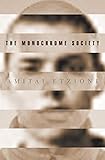The Monochrome Society / Amitai Etzioni.
Material type: TextSeries: New Forum Books ; 67Publisher: Princeton, NJ : Princeton University Press, [2022]Copyright date: ©2001Description: 1 online resource (338 p.) : 2 line illus., 3 tablesContent type:
TextSeries: New Forum Books ; 67Publisher: Princeton, NJ : Princeton University Press, [2022]Copyright date: ©2001Description: 1 online resource (338 p.) : 2 line illus., 3 tablesContent type: - 9780691225401
- Social problems -- United States
- Social values -- United States
- SOCIAL SCIENCE / Sociology / General
- American Demographics
- American creed
- Bar Mitzvah
- Black Leadership Forum
- Bowman, Carl
- Brandeis University
- Buchanan, Patrick
- Cato Institute
- Civil Rights Day
- Encyclopedia of Sociology
- Geocities
- Good Samaritan act
- Graham, Lawrence Otis
- Heritage Foundation
- Howard University
- International Institute
- Jewish holidays
- Latino leadership
- Libertarian Party
- Mardi Gras
- Nation of Islam
- acting agent
- admonition shaming
- affirmative action
- age of knowledge
- black middle class
- cannibalism
- cobbling communication
- communal memory
- covenant marriage
- death penalty
- downshifters movement
- eBay auctions
- economic inequalities
- employee representation
- fairness concept
- female holiday roles
- global consumerism
- incorporation
- individualists
- knowledge age
- legal centralism
- moral justification
- nationalism
- nonmaterialistic satisfaction
- one drop rule
- opportuning virtue
- patrochialism
- private property
- rational choice theory
- reintegrative shaming
- social capital
- 306.0973 21
- HN90.M6
- HN90.M6 E79 2003
- online - DeGruyter
| Item type | Current library | Call number | URL | Status | Notes | Barcode | |
|---|---|---|---|---|---|---|---|
 eBook
eBook
|
Biblioteca "Angelicum" Pont. Univ. S.Tommaso d'Aquino Nuvola online | online - DeGruyter (Browse shelf(Opens below)) | Online access | Not for loan (Accesso limitato) | Accesso per gli utenti autorizzati / Access for authorized users | (dgr)9780691225401 |
Browsing Biblioteca "Angelicum" Pont. Univ. S.Tommaso d'Aquino shelves, Shelving location: Nuvola online Close shelf browser (Hides shelf browser)

|

|

|

|

|

|

|
||
| online - DeGruyter Venus in Transit / | online - DeGruyter Incentives and Institutions : The Transition to a Market Economy in Russia / | online - DeGruyter Classical Pasts : The Classical Traditions of Greece and Rome / | online - DeGruyter The Monochrome Society / | online - DeGruyter The State, Identity, and the National Question in China and Japan / | online - DeGruyter A Woman Under the Surface : Poems and Prose Poems / | online - DeGruyter Self-Policing in Politics : The Political Economy of Reputational Controls on Politicians / |
Frontmatter -- CONTENTS -- ACKNOWLEDGMENTS -- INTRODUCTION -- I The Monochrome Society -- II Is Shaming Shameful? -- III The Post-Affluent Society -- IV Can Virtual Communities Be Real? -- V Suffer the Children -- VI Holidays: The Neglected Seedbeds of Virtue -- VII Salem without Witches -- VIII Social Norms: The Rubicon of Social Science -- IX Why the Civil Society Is Not Good Enough -- X Virtue and the State A Dialogue Between a Communitarian and a Social Conservative -- XI Restoring the Moral Voice -- XII Cross-Cultural Moral Judgments -- XIII Stakeholders versus Shareholders -- NOTES -- INDEX
restricted access online access with authorization star
http://purl.org/coar/access_right/c_16ec
Amitai Etzioni is one of the most influential social and political thinkers of our day, a man synonymous with the ideas of communitarianism. In this book, Etzioni challenges those who argue that diversity or multiculturalism is about to become the governing American creed. On the surface, America may seem like a fractured mosaic, but the country is in reality far more socially monochromatic and united than most observers have claimed. In the first chapter, Etzioni presents a great deal of evidence that Americans, whites and African Americans, Hispanics and Asian Americans, new immigrants and decedents of the Pilgrims, continue to share the same core of basic American values and aspirations. He goes on to show that we need not merely a civil but also a good society, one that nurtures virtues. He assesses key social institutions that can serve such a society ranging from revived holidays to greater reliance on public shaming. The most effective sources of bonding and of shared ideas about virtue, he insists throughout, come from the community, not from the state. Etzioni also challenges moral relativists who argue that we have no right to "impose" our moral values on other societies. He responds to those who fear that a cohesive community must also be one that is oppressive, authoritarian, and exclusive. And he explores and assesses possible new sources and definitions of community, including computer-mediated communities and stakeholding in corporations. By turns provocative and reassuring, the chapters here cut to the heart of several of our most pressing social and political issues. The book is further evidence of Etzioni's enduring place in contemporary thought.
Mode of access: Internet via World Wide Web.
In English.
Description based on online resource; title from PDF title page (publisher's Web site, viewed 29. Jul 2022)


